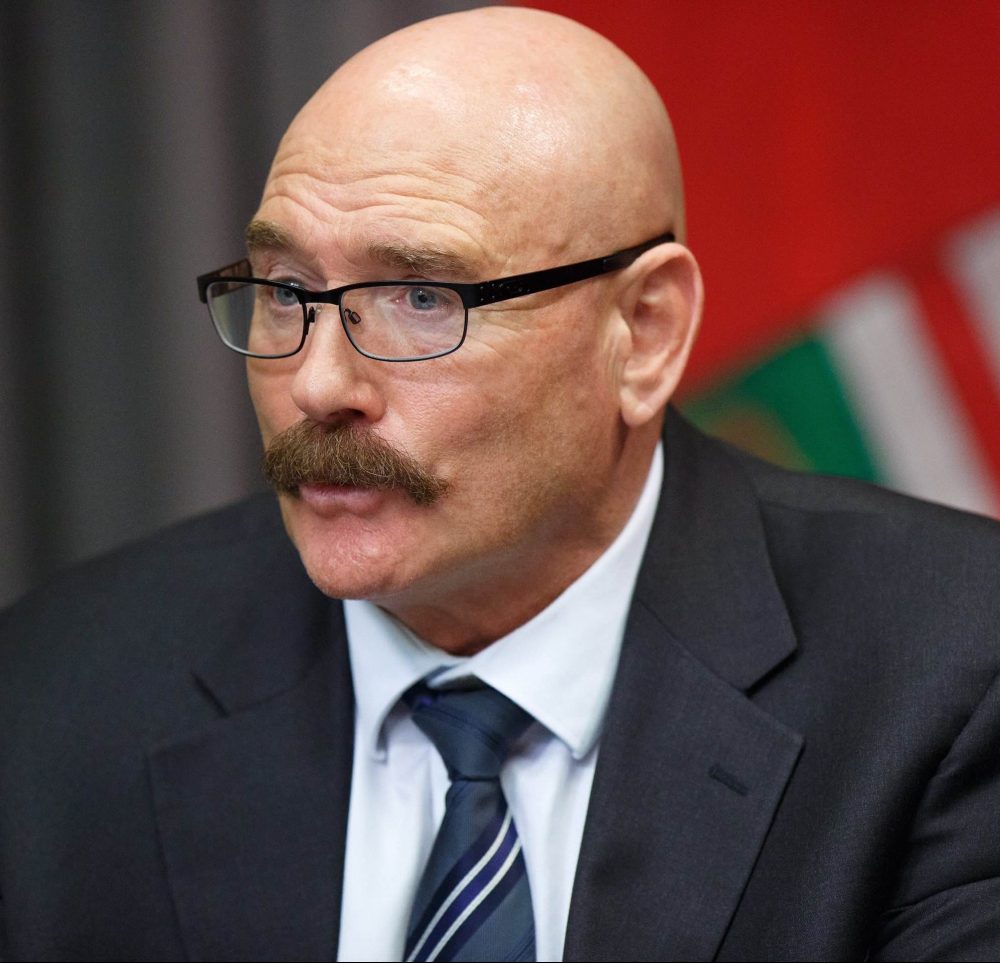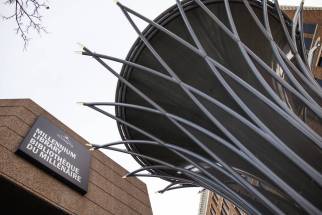Manitoba’s out-of-province surgery strategy called pricey political tactic
Read this article for free:
or
Already have an account? Log in here »
To continue reading, please subscribe:
Monthly Digital Subscription
$0 for the first 4 weeks*
- Enjoy unlimited reading on winnipegfreepress.com
- Read the E-Edition, our digital replica newspaper
- Access News Break, our award-winning app
- Play interactive puzzles
*No charge for 4 weeks then price increases to the regular rate of $19.00 plus GST every four weeks. Offer available to new and qualified returning subscribers only. Cancel any time.
Monthly Digital Subscription
$4.75/week*
- Enjoy unlimited reading on winnipegfreepress.com
- Read the E-Edition, our digital replica newspaper
- Access News Break, our award-winning app
- Play interactive puzzles
*Billed as $19 plus GST every four weeks. Cancel any time.
To continue reading, please subscribe:
Add Free Press access to your Brandon Sun subscription for only an additional
$1 for the first 4 weeks*
*Your next subscription payment will increase by $1.00 and you will be charged $16.99 plus GST for four weeks. After four weeks, your payment will increase to $23.99 plus GST every four weeks.
Read unlimited articles for free today:
or
Already have an account? Log in here »
Hey there, time traveller!
This article was published 22/12/2022 (1081 days ago), so information in it may no longer be current.
A Manitoba surgeon compares the Tory government’s plan to send people out of province for hip and knee procedures to applying a bandage on a hemorrhaging artery, as the controversial program falls behind targets and operations continue to be cancelled close to home.
“Sending people away for surgeries that can be done at home comfortably, and in some cases as outpatient procedures, is not a good thing at all,” Manitoba Orthopaedic Society president Dr. Jason Crosby said in an interview.
“It will never get the full support from us because it’s not a patient-driven model,” Crosby said. “The money and the time would be better focused and better spent on bolstering our local resources to look after people.”
In late August, the Manitoba government’s surgical recovery task force expanded its out-of-province program to include patients who need hip and knee replacements. At the time, the additional contracts with private clinics in northwest Ontario, Fargo, ND., and Cleveland, Ohio, were described as a short-term measure to address lengthy surgical wait-lists from the COVID-19 pandemic.
MIKAELA MACKENZIE / WINNIPEG FREE PRESS Canadian Orthopedic Association Manitoba chapter president Dr. Jason Crosby.
As many as 225 people were contracted for treatment this calendar year. However, fewer than 60 people have made the trek to date and just 90 people have signed up for the trip, prompting the task force to send letters appealing directly to patients on wait-lists to drum up interest.
The task force had relied on physicians to refer patients to the program before it established its own intake portal. However, Crosby said the program had shortcomings from the start, which may have dissuaded uptake and referrals.
Most local surgeons do not have the time or the resources to go through their patient lists and provide consultations for a procedure they will not perform, Crosby said. Providing post-operative care to patients with potential complications — not having performed the surgery themselves — may also be a concern for doctors, he added.
Meanwhile, patients are understandably concerned about travelling hundreds of kilometres amid a global pandemic while in significant pain or poor health, he said.
“Sending people away for surgeries that can be done at home comfortably, and in some cases as outpatient procedures, is not a good thing at all.”–Dr. Jason Crosby
And with significant tax dollars dedicated to performing surgeries elsewhere, hip replacements are still being cancelled in Winnipeg owing to a lack of beds, Crosby noted.
Earlier this month, seven surgeries were cancelled the day they were scheduled to be performed at the Grace Hospital, including at least one hip replacement, the Free Press reported on Wednesday.
According to the Winnipeg Regional Health Authority, of the more than 3,600 elective surgeries scheduled last month, 6.5 per cent, or about 230 cases, were postponed. In Manitoba, the wait-list for hips and knees included 3,023 people as of October.
Sending patients away for care will not fix the massive bleed in hospitals while simultaneously taking a step towards a two-tiered system, Crosby said.
He characterized the program — which he estimated to cost at least twice as much per procedure — as an expensive political tactic that does little to help in the long run. The province has not disclosed the cost of its contracts with clinics in Ontario and the United States.
“There’s just not enough resources, money or doctors and nurses to go around to look after the population as it is, and so all this is, is a shell game, trying to shift some of the burden away at an extra cost to the taxpayer.”–Dr. Jason Crosby
“We’ve got a broken, desperate health-care situation in the system going on right now,” Crosby said, noting Manitoba physicians are fighting each day to meet a standard of care, but feel their hands are tied owing to constraints beyond their control.
“There’s just not enough resources, money or doctors and nurses to go around to look after the population as it is, and so all this is, is a shell game, trying to shift some of the burden away at an extra cost to the taxpayer.”
Crosby stressed that doctors are thankful to have an option to offer patients while the Manitoba health system struggles to achieve its mandate, adding feedback about the care in Ontario and the United States has been positive.
MIKE DEAL / WINNIPEG FREE PRESS FILES Manitoba government’s surgical recovery task force director David Matear.
However, the bottom line is the health system can do better for the thousands of people waiting in pain by focusing on long-term local solutions and by directing funding to the front-lines, Crosby said.
“The main hope for most of us is that we can just to get the work done here,” he said.
Task force director David Matear said there has been a concerted effort on behalf of the task force to get both physicians and patients on board with the program.
Matear stressed that out-of-province surgery is a short-term measure while the task force builds capacity locally. He noted funding caps for surgery have been lifted and hospitals are being encouraged to maintain operating volumes, even if they’re approaching their usual annual baseline.
A fifth operating room is scheduled to open at Concordia Hospital in April, which will increase annual hip and knee procedure capacity by 1,000 cases.
MIKAELA MACKENZIE / WINNIPEG FREE PRESS A fifth operating room is scheduled to open at Concordia Hospital in April, which will increase annual hip and knee procedure capacity.
“Where we offer this short term, elimination of a backlog, which actually helps patients access care, whether they’re first or last on the waiting list, it means everyone accesses care quicker,” Matear said. “Everyone has to fully understand and appreciate what we’re trying to do and that type of communication, collaboration is extremely important in order for this to be successful.
“That takes time,” he said.
Dr. Eric Bohm, an orthopedic surgeon and task force member, said ideally care would be provided in Manitoba, but the capacity doesn’t exist to clear the backlog in a timely way. He acknowledged support for out-of-province surgery may vary among his colleagues.
“There’s been an effort by many orthopedic surgeons to increase the surgical capacity within the province long before this COVID pandemic hit,” Bohm said. “There’s sort of an ongoing frustration with what’s happened now and that the solution is sending patients out of province.
“In a time where cost of living has skyrocketed…. there are a lot of Manitoba families who simply don’t have the capacity to go to another country to get health care.”–Uzoma Asagwara, NDP health critic
“But at the end of the day, surgeons want what’s best for their patients, and to get timely high-quality surgery in a timely fashion,” Bohm said. “So they’ll be supportive from that perspective.”
Health Minister Audrey Gordon was not made available to comment Thursday. In a statement, a spokesman listed over $200 million in spending initiatives and reiterated that out-of-province surgery is temporary.
“The focus of the (task force) is to build capacity right here in Manitoba,” the spokesman said.
NDP health critic Uzoma Asagwara said out-of-province surgery is not in the best interest of Manitobans and the government has wasted precious months responding to wait lists for hip and knee procedures, which have not been meaningfully addressed.
“Everyone recognizes that people have the best chance at good outcomes when they get health care here at home,” Asagwara said. “In a time where cost of living has skyrocketed…. there are a lot of Manitoba families who simply don’t have the capacity to go to another country to get health care.”
danielle.dasilva@freepress.mb.ca

Our newsroom depends on a growing audience of readers to power our journalism. If you are not a paid reader, please consider becoming a subscriber.
Our newsroom depends on its audience of readers to power our journalism. Thank you for your support.













